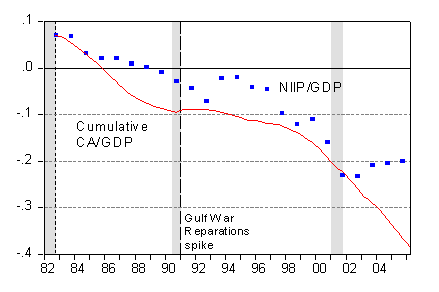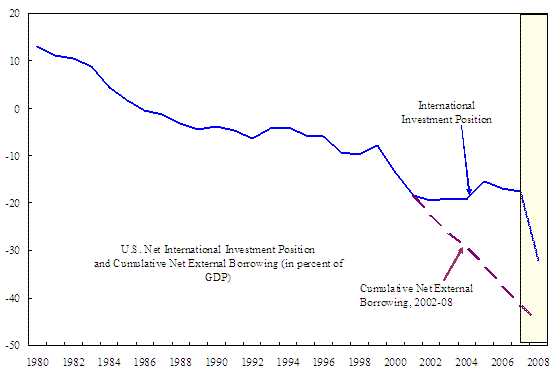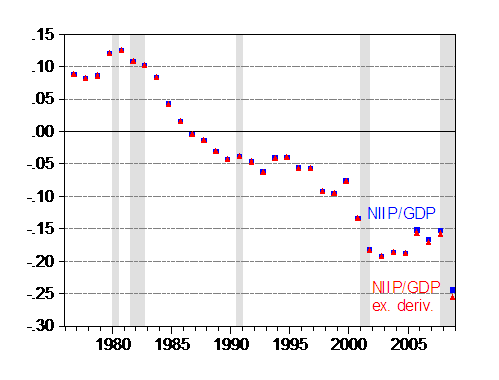In my last post, I cited Jeff Frankel’s keynote speech from a recent Bank of Canada-ECB workshop. He also pointed to the end of “Exorbitant Privilege” and “Dark Matter”, and other arguments of American exceptionalism. I think we’ll see resounding evidence of this in Friday’s release of the US end-2008 Net International Investment Position (NIIP).
First, recall nearly two and a half years ago, I posted this figure…

Figure 1: Net International Investment Position, end-year (blue squares), and Cumulative Current Account balance on a NIPA basis (red line), as a ratio to GDP. NBER recession dates in gray shading. Sources: BEA International Investment Position release of June 2006, BEA NIPA release of October 2006, NBER, and author’s calculations. Originally posted here
…and asked if “gravity can be defied?” At the time, I argued the answer was “no”, and observed that NIIP reversion to the cumulated current account series often occurred around recessions (see also [0]). The new release is likely to also provide the answer “no”.
Gian Maria Milesi-Ferretti’s VoxEU post from January this year anticipated this conclusion. He wrote:
To be sure, the US current account deficit remains large, but with a dramatic decline in domestic demand, plummeting oil prices, and the lagged effects of past dollar depreciation helping US exports, recourse to external borrowing in the US has declined and is projected to fall further the next few years. Yet preliminary estimates suggest that last year featured the most significant deterioration in the US net external position to-date: over 2 trillion dollars. What explains such a large decline? And what consequences will it have going forward? [Emphasis added — mdc]
In his Figure 1, he shows what was implied by cumulated current account balances going forward from 2002, and what the actual evolution of the NIIP was.

Figure 1 from Milesi-Ferretti (2009).
He also provides an estimate for end-2008 NIIP to GDP ratio. As Milesi-Ferretti observe, end-2008 will see a drastic deterioration in the US NIIP. Cline (2009), discussed in this Peterson IIE piece, provides a similar estimate of 30.8 ppts of GDP for 2008, while John Kitchen‘s own personal estimate is somewhat less pessimistic, although the differences may arise from how FDI is valued (i.e., market vs. cost basis). But the deterioration is still significant.

Figure 2: Estimated US NIIP. Source: John Kitchen.
Frankel’s point, regarding exorbitant privilege (and by extension “dark matter”), is relevant here:
Some argue that the privilege to incur dollar liabilities has been earned in a different way: The United States has been appropriately exploiting its comparative advantage in supplying high-quality assets to the rest of the world. Recent examples include Caballero, Farhi and Gourinchas; Cline; Cooper (2005); Forbes (2008); Hausmann and Sturzenegger (2006a, 2006b); Ju and Wei (2008) and Mendoza, Quadrini, and Rios-Rull (2007a, b). In one version, the United States has been operating as the World’s Banker or the World’s Venture Capitalist, accepting short-term liquid deposits and making long-term or risky investments (Gourinchas and Rey). Recurrent upward revaluations in the dollar price of US overseas assets have in effect financed much of the US deficits; some believe that the valuation effects are not an unsustainable coincidence, but rather a component of the sustainable returns that the United States enjoys as world banker.
Put me in the camp that says the revaluations are an “unsustainable coincidence”.
Some longer term prediction from Peterson Institute for International Economics here.
(By the way, some people might wonder why I’m writing about the release before the release — it’s because it’s the only way I could beat Brad Setser to the punch…)
[Update 7:35AM Pacific, 6/26/09: The new NIIP data is out]

Figure 2: Net International Investment Position, end-year (blue squares), and NIIP ex. derivatives, (red triangles), as a ratio to GDP. NBER recession dates in gray shading. Sources: BEA International Investment Position release of June 2009, BEA final 2009Q1 GDP release, NBER, and author’s calculations.
[Update 2:40pm Pacific]
Brad Setser discusses the release here.
Projection of net international investment income is arguably more enlightening than NIIP, which is clouded by valuation volatilty. Setser used to attempt this; haven’t seen much lately.
These reevaluations must be among the more complex adjustments the staff at BEA ever make. Presumably, the current market adjustments include changes inflation causes in the assets of every foreign owned asset in the U.S. Ditto for U.S. assets owned abroad in each separate country. Separately, the exchange value of currency is used to mofidy financial flows in both directions in and out of the U.S. Does the exchange value of currency influnce the market value of existing assets? Then the third modification is described but I am unable to summarize it.
Has an example showing the numeric details of all these adjustments ever been published? I assume the answer is yes, but I have not seen it.
My point is that I remain somewhat suspicious of these adjustments since they always seem to result in a reduction in the size of the Net International Investment Position of the U.S. Perhaps my suspicions will be proved incorrect when subsequent adjustments result in increasing the size of U.S. NIIP.
More bad economic news for America. Seems that’s the only kind the United States has any more. Most econ blogs almost seem to have become little more than daily chronicles of the economic fall of the U.S., a fall taking with it America’s last pretense of hegemony. I can’t understand how the U.S. economy at this point is even considered integral to the global economy aside from the question of everyone getting their money back out of it.
(An end to arguments of American exceptionalism, indeed, and not just economic.)
JKH and Reformer Ray: Brad Setser has some discussion of how the calculations are undertaken.
The projections in the Peterson link don’t seem realistic, since variables will change. For instance, the world wouldn’t finance such continuing, increasing large US borrowing to 2030 as one scenarios imagines. Neither would the US simply sheepishly go along with such a scenario.
Probably the US will have to insist on non-theft of intellectual property (films, software, inventions, etc.), and perhaps require no more subsidies of goods into the US, etc. Normally, if a current account stays so far out of balance, it just results in a currency revaluation, then a change in exports, etc. This normal response will probably be required.
“Probably the US will have to insist on non-theft of intellectual property (films, software, inventions, etc.)” – HB
HB, the end of American exceptionalism means that the US is no longer in a position to insist upon anything. Just try it – the Chinese would laugh in our faces.
Also many developing countries see overly restrictive IP laws as an attempt to prevent them from developing in the way the US did in the 19th century – through technology transfer. They’d consider us to be the thieves, not themselves.